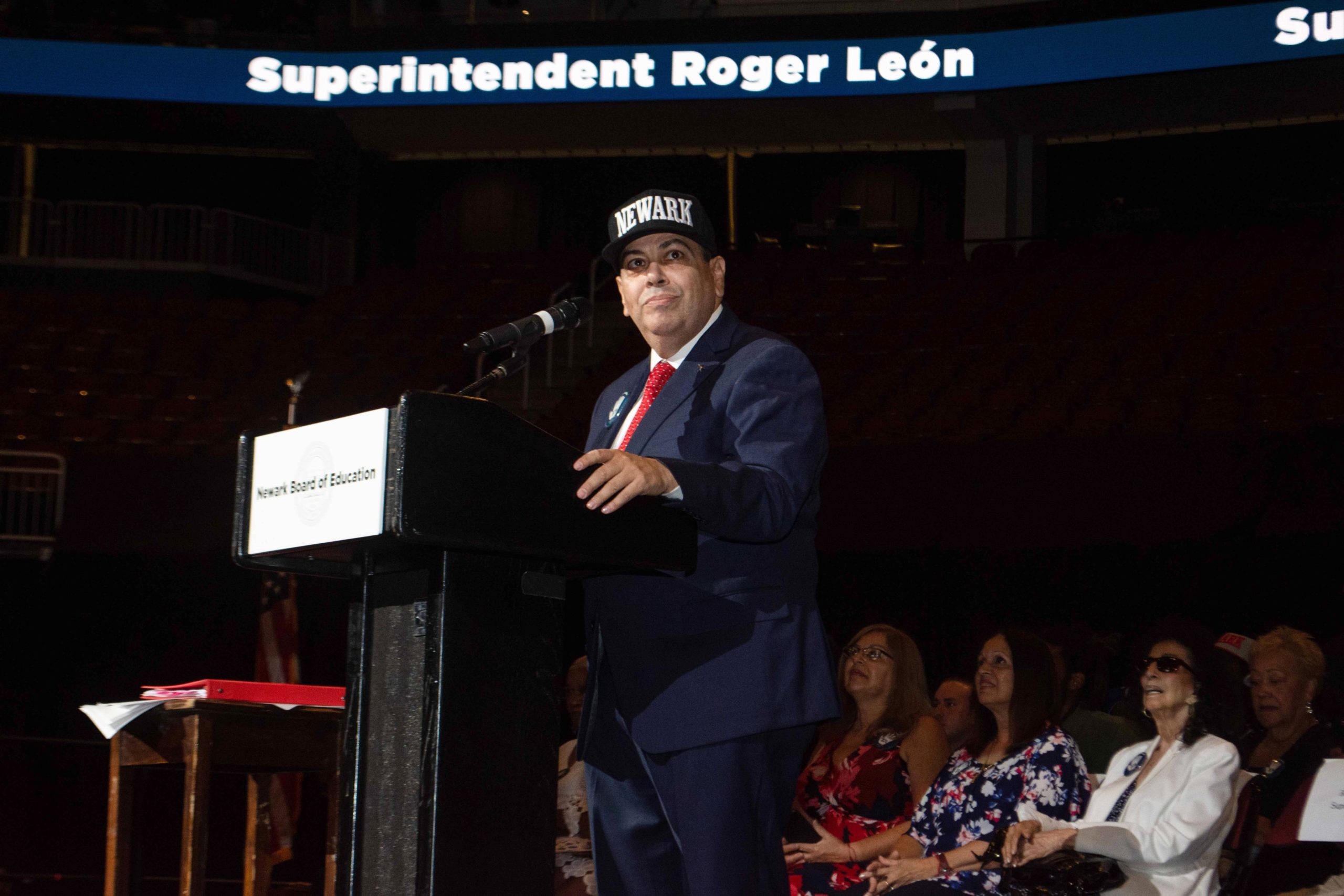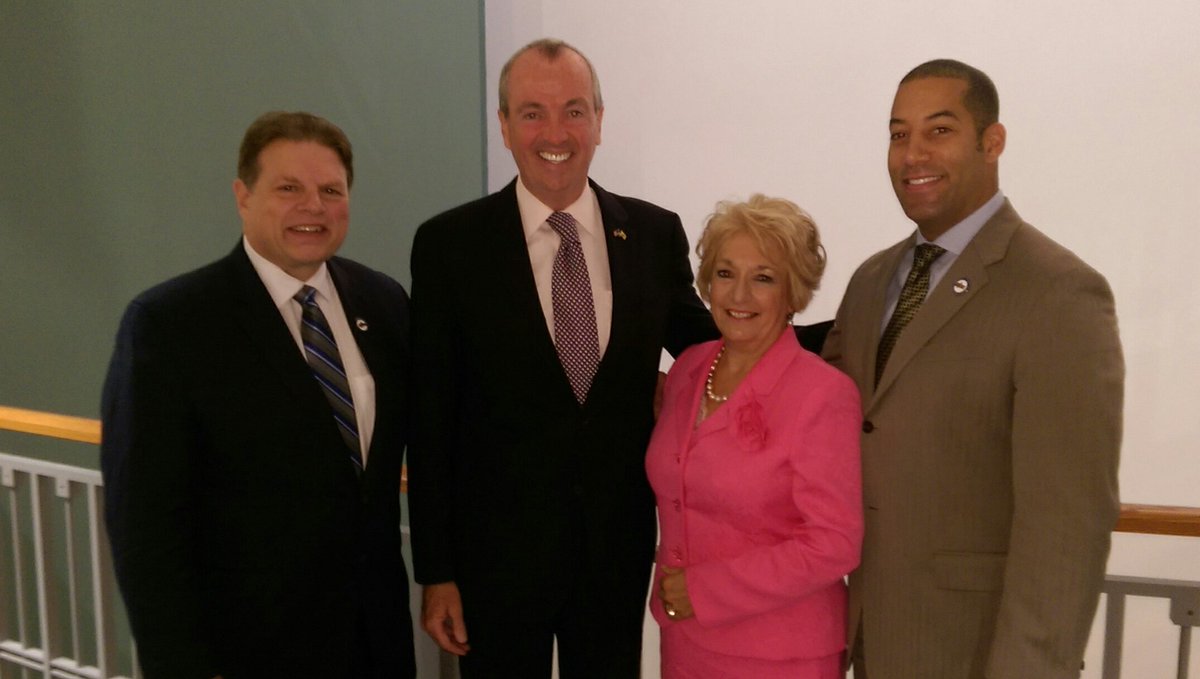
Cancel Culture in Newark: Superintendent Ignores Parent Voices and Demands Closure of Charters.
January 6, 2020
NJEA’s “Spider Web of Political Power”: A New Report Examines NJEA’s Ring Through Murphy’s Nose
January 9, 2020“Dear Commissioner Repollet”: NJ Children’s Foundation Fends Off Newark Superintendent’s “Ideology and Factual Misstatements” Against Charter Schools.
Below is a letter sent late yesterday from the New Jersey Children’s Foundation expressing the non-profit’s “vehement disagreement with the four letters submitted by the Newark school district last week opposing the renewal applications submitted by four Newark charter schools.” For my coverage of Newark Superintendent Roger Leon’s attempt to cancel parent voices, see here.
January 6, 2020 Dr. Lamont Repollet, Commissioner New Jersey Department of Education P.O. Box 500 Trenton, NJ 08625-0500 |
| RE: Newark Charter Renewal Applications Dear Commissioner Repollet: Please accept these comments on behalf of the New Jersey Children’s Foundation (NJCF) in response to the Newark School District’s comments on the renewal applications of four new charter schools: Roseville Community Charter School, Peoples Prep Charter School, University Heights Charter School, and METS Charter School. NJCF is a non-profit charitable foundation based in Newark that promotes collaboration between the city’s charter and district schools. We produce data and analysis about the state of the city’s schools and work closely with school leaders every day. We write to voice our vehement disagreement with the four letters submitted by the Newark School District in this matter. The ideology and factual misstatements that permeate those letters threaten years worth of work to create harmony between district and charter schools in Newark. Specifically, we disagree with the district’s letters for three main reasons: (1) Effective charter schools do not “harm” public school systems, they actually make them better, (2) the District has wildly overstated its fiscal circumstances, (3) The District’s analysis of the merits of the charter school renewal applications was late, boilerplate in nature, misleading, and inaccurate. But before we begin that discussion, we were surprised by Superintendent Leon’s letters for many reasons, but especially because he said something directly to the contrary in another letter just a few days later, to mark the sunset of the Newark Charter School Fund. In that letter he said, “There is no question that the creation and expansion of the Newark charter school system has played a critical role in improving education in the city…” We couldn’t agree more with that particular letter. Background on Newark’s Growing Culture of Charter-District Collaboration Today, more Newark kids are reading and doing math on grade level than ever before. However, getting here meant political strife and acrimony of the likes that most people in Newark never want to see again. It involved many difficult systemic changes to make the district run better, as well as the growth of a best-in-class public charter school sector. Mistakes were made along the way, no doubt, but what is also beyond a doubt is that citywide academic measures are all pointing up. In the wake of the political strife here, Mayor Baraka, city leaders like Councilman Anibal Ramos, and the city’s growing charter sector came together to forge a different path: one based on unity, collaboration and peaceful coexistence between the city’s burgeoning charter and district sectors–all just as the district was initiating a process to return to local control. This has meant that Newark charter schools have supported the local school district’s requests for additional state aid. It has also meant that large charter networks have brought resources to the table to share their best practices with the district in literacy instruction and college placement. It has also meant that “Unity Slates” of candidates for the local school board have come together to represent the city’s education stakeholders, and were elected by overwhelming margins every year since 2016. In short, what’s happened in Newark should be a model for other cities across America, where chaos and strife between charter and district schools is getting worse, not better. Newark can lead the way. But that goodwill is premised upon the district collaborating with the city’s charter sector. It is hurt by secret missives to the Commissioner with copy-pasted, boilerplate arguments pulled from anti-charter activist publications urging the state to close every single charter that was up for renewal this year. Nor do we think that the district should blindly support the renewal of any and all charter schools–in fact, part of the success in Newark has involved closing down ineffective charters (something we wholeheartedly support). Newark’s hard-won collaborative environment is a gem whose value inures to all of the city’s beautiful children who now have a better school system as a result. (1) Effective charter schools do not “harm” public school systems, they actually make them better–and Newark is a great example. The most important indicator of the health of a public education system is not how much funding a school receives, or how many employees it has, but rather how many students are learning at grade level. What’s clear is that Newark’s school system got better during a period of rapid charter school growth–not worse. Kids are better off. This is unequivocal fact grounded in cold, hard data published by the state. Since 2006, Newark’s charter school sector has grown from 7 percent of the city’s 44,000+ public school students to now over 35 percent of the city’s 50,000+ students. Our Foundation has extensively documented the historic progress of the city’ school system over that time period in a report by Jesse Margolis, PhD, of Margrady Research titled “A New Baseline: Progress In Newark’s District And Charter Schools From 2006 To 2018.” That report documents the net performance of all public schools in the city, and shows that Newark rose from near the bottom to the top ranks of New Jersey’s low-income school districts. Graduation rates went up. Student learning growth accelerated. And this is not spin using charter performance to mask struggles in the district sector: the district’s reading and math proficiency rates improved substantially too. |

Nor is there some harmful, hidden underbelly to this improvement story. Despite the predictions, special education and poverty rates at the district did not go up, racial segregation did not get worse, and the city’s growing charter school sector served an equal amount of students in poverty and increased their special education enrollment. We looked at all of these indicators starting in 2011 when the reforms in Newark began in earnest and it’s clear that more than doubling the size of the charter sector did not cause the sky to fall in Newark–in fact, things got better.

And the letter’s citation to well-known anti-charter activist publications is without merit. First, Bruce Baker (the author of the Economic Policy Institute study cited by the Newark District) has been caught in a recording discussing how his pay to play research system works and the study cited is national in nature, having nothing to do with Newark. Second, the report by anti-charter activist Julia Sass-Rubin, has already been discredited as under-counting high-need special education students at charter schools due to data suppression rules, and is not a disinterested academic paper, but rather was funded by anti-charter foundations.
Lastly, if charter schools in Newark are alleged to not enroll enough students with special needs, that is the responsibility of the Newark school district, which serves as “system administrator” to the city’s common enrollment system. That system has in place a preference for ELL and special education eligible students built into it. All of the charter schools at issue are participants in that system and must adhere to those rules.
Newark’s approach to growing good charter schools, closing down ineffective ones, and collaboration between the district and charter sectors has meant Newark kids are beating the odds every day. According to a 2015 study by the Center for Reinventing Public Education, Newark has more “beat the odds schools” than any other city they studied–by a substantial margin. Charter schools played an important role in that progress, and aren’t the source of any problems the district faces.
(2) The District has wildly overstated its fiscal circumstances, including the impact of charter schools on its budget.
The Newark school district should not use charter schools as a convenient scapegoat for their fiscal challenges. The simple fact is that the district’s enrollment has been largely flat or down, yet per state aid summary data, the district’s annual state aid has steadily increased by almost $100M. The district’s own budget summaries report that even after a decade of charter growth, it is has run multi-million dollar budget surpluses due to “aggressive budget management.” So much so that your department, in a letter just last month, rejected most of the district’s request for emergency aid on the grounds that the district was running a surplus. In addition, a local tax increase for the schools will add millions more to the district’s budget each year.
These numbers speak for themselves:

| Moreover, the arguments about harm to the district have also been roundly rejected by New Jersey’s Court of Appeals in cases like In Re Renewal Application of TEAM Academy. In that case, the court stated: “[T]he District has to pay the charter schools only 90% of certain student funding categories, and retains 10%—an amount designed to respond to concerns about the loss of funding. […] On paper, the reduced per pupil allocation should ease the budgetary pressures— not worsen them.” The appellate court went on to say that: “[T]he legislative formula is designed to maintain school funding at the constitutionally required level despite the existence of charter schools… The District’s budget is reduced by charter school expansion. But it is educating significantly fewer students. It is simply not clear whether the reductions in available funds is attributable to reduced enrollment.” It’s also worth noting that the district just signed a very large teachers contract that could be one of the most expensive on record and is opening new schools during a period of largely flat enrollment. All of these decisions come with new costs, and all have nothing to do with charter schools. That said, our organization recognizes that Newark (like many districts across New Jersey) is not receiving the funding it is owed under the state funding formula–to the tune of $174M according to the district. Newark’s public school students deserve every penny of that funding, and we support the recent state law (S2) that would fix this problem across the state over the next several years. Those funds belong to Newark children, no matter what type of public school their parent selects for them, and that issue is one where charter and district schools are on the same side. (3) The District’s analysis of the merits of the charter school renewal applications was late, lacked board approval, was boilerplate in nature, and misleading. First, it is quite ironic that the district alleges compliance problems by the affected charter schools, but they themselves disregarded state regulations and missed the 30-day deadline to submit their comments on these renewal applications, per N.J.A.C. 6A:11-2.3. The district’s December 13 letters were submitted nearly two weeks past the November 30 deadline. Moreover, while they are submitted in the name of the Newark Board of Education, and on that letterhead, they were never approved or reviewed by the Board at any public meeting from what we can tell, also contravening N.J.A.C. 6A:11-2.3 which gives the comment rights to the “board of education.” It also seems that the Newark school district skipped the section in NJDOE rules about charter funding. In the letter regarding People’s Prep Charter School, they allege that the charter school is “illegally” enrolling students when in fact, state rules permit charter schools to “over-match” applicants to their school above the state-approved enrollment, but mandate that they will not receive funding for those additional students. The NJDOE’s “Charter School Enrollment for School District Users” manual explicitly contemplates this practice by stating on page 22 “Note: Charter schools do not receive funding for any student on the over enrolled student list” in the section labeled “charter school over-enrollment.” It’s also ironic that the district would allege violations of the common enrollment system MOU when the Newark school district has repeatedly violated that MOU this year in a well-documented manner. In April, the district was late in sending match letters to families letting them know what school they could attend in the fall. In June, they unilaterally shut down the enrollment website for families without notice or discussion with the board of education or participating charter schools, in violation of MOU Section 6(B)(1) and (B)(6) that contemplates it being open until September 2019. For months over the summer, the district mis-labeled charter schools as being “waitlist only” even if they had open seats, in violation of Section 6(A)(1)(E) of the MOU, no doubt leading to families not choosing the charter school they wanted. In September, the district unilaterally shut down its family support center, also in violation of Section 6(F) of the system MOU which required the family support center to work with families “throughout the school year.” In spite of those challenges, most Newark charters decided to collaborate with the district on this system for another year because it is what is best for families. That was a decision we applauded. But that does not excuse the compliance lapses and their impact on families. Next, the Newark school district’s arguments against specific charter schools were mostly copy-paste, boilerplate rhetoric with very little evidence or discussion. The first section of every letter is the same, word-for-word. Moreover, the first paragraph is the same in every letter in the section labeled “[charter school name] fails to enroll and serve a cross-section of Newark’s school age population.” They simply repeated the same arguments for every charter, then sometimes went to search for evidence to support the claim. In other cases, they simply made boilerplate, conclusory claims about charter schools with any evidence whatsoever. Every letter contains the line: “As [charter school name] offers no such different or innovative methods or an any educational approach or methods unavailable in District schools, the renewal application fails to demonstrate any need for the school’s continued existence…” Lastly, the district’s selective use of test scores reveals the lack of any objectivity in its analysis. In the letter regarding University Heights Charter School, the district mentioned both its student proficiency rates in math and ELA, as well as its student growth rates in both subjects. Yet, in the case of Roseville Community Charter, the district ignored proficiency rates and only used growth rates. Why? Because Roseville’s proficiency rates were higher than the district’s nearly every year. Moreover, the district compares the test scores of People’s Prep Charter School (an open-enrollment, comprehensive charter high school) with Bard Early College High School, a school where they literally screen student applicants based on their test scores, behavior and other academic admission criteria. Bard is a great school but to compare it to People’s Prep is akin to comparing apples and oranges. Conclusion We think under-performing charter schools should be closed. With greater flexibility comes greater accountability for results. If a school has been low-performing for years and hasn’t improved, it should be closed. New Jersey had led the way nationally in making this most difficult of decisions to close under-performing charter schools and shouldn’t stop now. However, closure decisions should be made with the utmost attention to the specific circumstances of every school and the hundreds of affected families. The one-size-fits-all and overly-ideological letters submitted by the Newark school district did not meet that standard. Nor did they represent the history of collaboration and goodwill between the sectors that is vital. We remain optimistic that the NJDOE will look past this rhetoric and make decisions that show the best way forward for the hundreds of Newark families affected. Thank you for your attention in this matter. |





3 Comments
[…] The grievances Leon cites [see the bottom of this article for the letter he wrote to the DOE; see response from Kyle Rosenkrans of the NJ Children’s Foundation and see here for my take] are bathed in falsehoods. Relevant […]
[…] University Heights — will keep their doors open. For earlier coverage from NJLB, see here, here, here, and […]
[…] Kyle Rosekrans of the New Jersey Children’s Foundation explains, […]